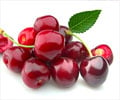
‘Proanthocyanidins present in cranberries could improve the effectiveness of currently available antibiotics aiding to prevent the emergence of resistance.’
Read More..Tweet it Now
"Normally when we treat bacteria with an antibiotic in the lab, the bacteria eventually acquire resistance over time," said McGill chemical engineering professor Nathalie Tufenkji, lead author of the study. "But when we simultaneously treated the bacteria with an antibiotic and the cranberry extract, no resistance developed. We were very surprised by this, and we see it as an important opportunity." Read More..
Analyses showed that the cranberry extract increases bacterial sensitivity to antibiotics by acting in two ways. First, it makes the bacterial cell wall more permeable to the antibiotic, and second, it interferes with the mechanism used by the bacteria to pump out the antibiotic. Consequently, the antibiotic penetrates more easily, and the bacteria have a harder time getting rid of it, which explains why the drug is effective at lower doses.
"These are really exciting results," said coauthor Éric Déziel, a professor of microbiology at INRS. "The activity is generated by molecules called proanthocyanidins. There are several different kinds of proanthocyanidins, and they may work together to deliver this outcome. We'll need to do more research to determine which ones are most active in synergy with the antibiotic."
After confirming the activity of the cranberry molecules on bacterial culture, the researchers tested to determine whether the pattern persisted in a preliminary animal model: infected insects. Since the synergistic effect of the extract and the antibiotic was also observed in the insects, further experiments will be conducted to clearly identify the active molecules.
If the results are confirmed in animals, certain classes of antibiotics subject to high levels of resistance could be made useful again by using cranberry extract to boost their potential.
Advertisement
Advertisement












